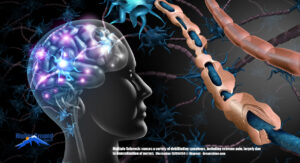Multiple Sclerosis (MS) is a progressive disease that causes a wide range of unpleasant and debilitating symptoms, from cognitive difficulties to numbness to extreme pain. In healthy subjects nerves are coated in a sheath of a substance called myelin that protects the nerve from damage. For reasons scientists have yet to pin down, the nerves of MS patients become stripped of myelin over time in a process known as demyelination.
The brain does not know how to properly process the stimuli of demyelination, so it registers the sensation as pain. Therefore, MS patients experience a wide spectrum of painful symptoms. Many patients find cannabis to be the most successful option for pain relief from MS. Furthermore, while offering pain relief, cannabis is able to also simultaneously offer relief from various side effects caused by intractable pain, including but not limited to appetite loss, depression, sleep disruption and more.(1,2)

Neurologist Uses Cannabis to Treat Pain In Patients With Multiple Sclerosis
Although it is a well-known and well-proven fact that cannabis products effectively treat a wide variety of medical conditions with minimal side effects, the shifting patchwork of laws and the clash between state and federal cannabis laws have made it a taboo topic for most American MDs. However, some doctors are open to exploring the medicinal benefits of cannabis to treat their patients and are making contributions to the legalization of medicinal cannabis via their own research and advocacy efforts. One such doctor is Dr. Annette F. Okai, a neurologist who specializes in treating patients with MS at The Center for Multiple Sclerosis Treatment in Dallas, TX.
In 2019, Dr. Okai presented a rare academic lecture titled “Cannabis and MS,” which highlighted the potential benefits of cannabis products to Multiple Sclerosis patients. The American mainstream medical community is just beginning to embrace the medicinal applications of cannabis after decades of skirting around the topic. Dr. Okai’s presentation was a rare endorsement of this approach from a flagship institution in the mainstream medical community.(3)
Dr. Okai commonly recommends her patients with MS take melatonin, a natural supplement meant to improve sleep cycles, but mentioned that she always has to caution them to only use it short-term. Otherwise, the brain becomes dependent on the supplemental melatonin and ceases to produce a sufficient quantity of its own. She noted that she appreciates the lack of dependency — both physically and psychologically — associated with cannabis consumption as a treatment method for her patients. The low risk of dependency and/or addiction to cannabis in comparison to that of other pharmaceuticals used for pain relief means she has one less factor to consider when treating complex conditions such as Multiple Sclerosis.(3)
Cannabis Relieves A Wide Range of Other Symptoms of Multiple Sclerosis
Aside from controlling pain, managing spasticity and seizures are two of the most medically useful aspects of cannabis. In fact, seizure management is the only legal use for cannabis in some US states, through a CBD product called Epidiolex, which the FDA has approved for use in persistent pediatric epilepsy.(4) Muscle spasticity is another particularly problematic symptom caused by MS which cannabis is able to manage. Individuals with MS tend to experience muscle spasms, or spasticity, with no obvious cause, and this painful and annoying symptom worsens in severity as their condition progresses.(5) This is especially bothersome at night, as their sleep is already disrupted by pain and other symptoms — including mental health symptoms such as anxiety, which is also treated effectively by cannabis.(6)
In conclusion, cannabis provides many benefits that could alleviate symptoms of Multiple Sclerosis — such as managing sleep, mood, nausea, pain, and appetite —, without causing adverse effects such as addiction or the secondary consequences of traditional pharmaceuticals.(2) Although there are still some hurdles American MS patients must overcome in certain states, the nation is trending toward legalization of cannabis for medicinal use in the treatment of MS.
***
References:
- Rudroff T. (2019). Cannabis for Neuropathic Pain in Multiple Sclerosis-High Expectations, Poor Data. Frontiers in pharmacology, 10, 1239. https://doi.org/10.3389/fphar.2019.01239
- Amatya, B., Young, J., & Khan, F. (2018). Non-pharmacological interventions for chronic pain in multiple sclerosis. The Cochrane database of systematic reviews, 12(12), CD012622. https://doi.org/10.1002/14651858.CD012622.pub2
Multiple Sclerosis Foundation. (2019, August 17). Dr. Annette Okai, MD – Cannabis in MS [Video file]. Retrieved from https://youtu.be/qsWvtknDdSE - Abu-Sawwa, R., Scutt, B., & Park, Y. (2020). Emerging Use of Epidiolex (Cannabidiol) in Epilepsy. The journal of pediatric pharmacology and therapeutics : JPPT : the official journal of PPAG, 25(6), 485–499. https://doi.org/10.5863/1551-6776-25.6.485
- Malfitano, A. M., Proto, M. C., & Bifulco, M. (2008). Cannabinoids in the management of spasticity associated with multiple sclerosis. Neuropsychiatric disease and treatment, 4(5), 847–853. https://doi.org/10.2147/ndt.s3208
- Wright, M., Di Ciano, P., & Brands, B. (2020). Use of Cannabidiol for the Treatment of Anxiety: A Short Synthesis of Pre-Clinical and Clinical Evidence. Cannabis and cannabinoid research, 5(3), 191–196. https://doi.org/10.1089/can.2019.0052



